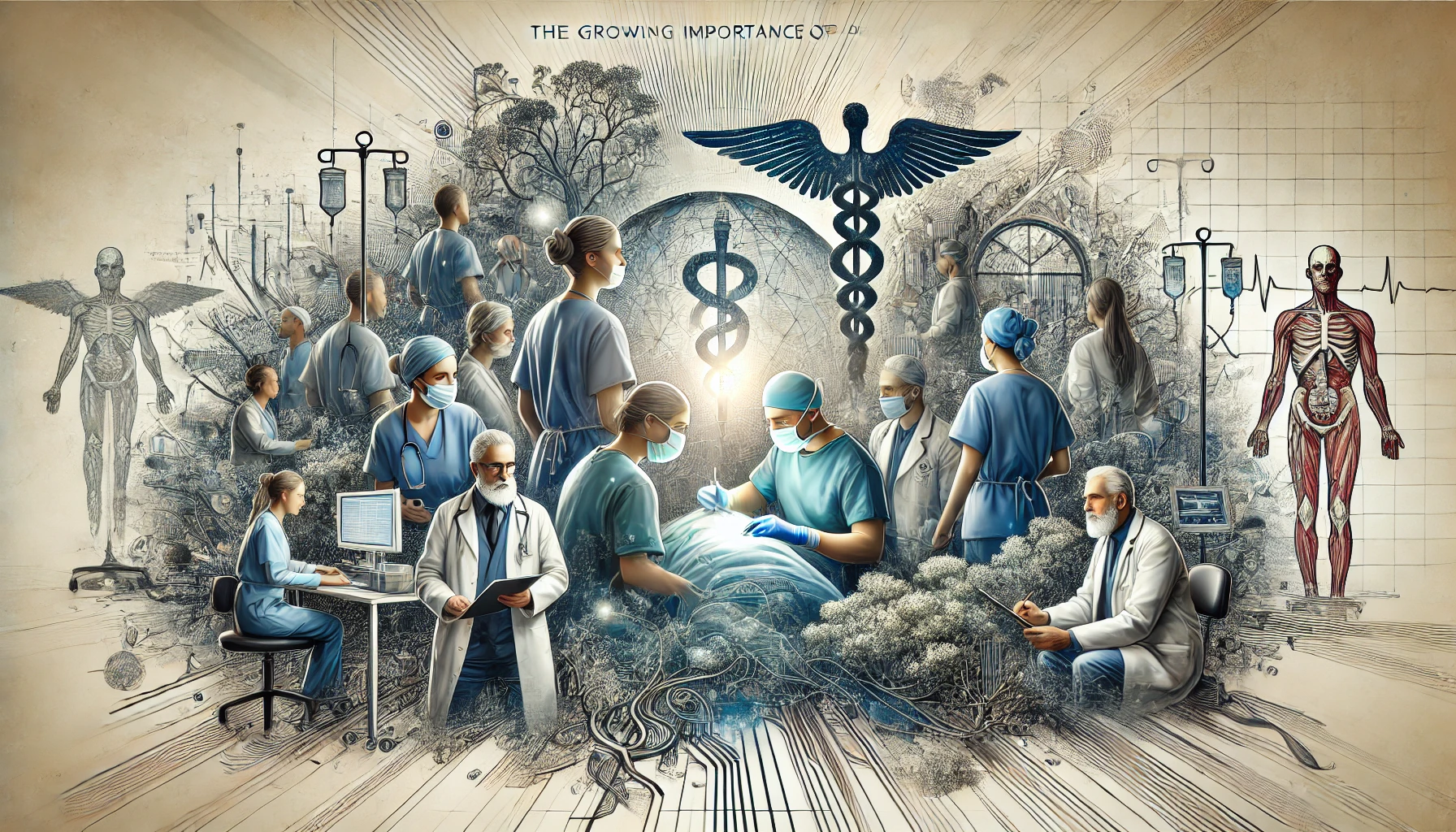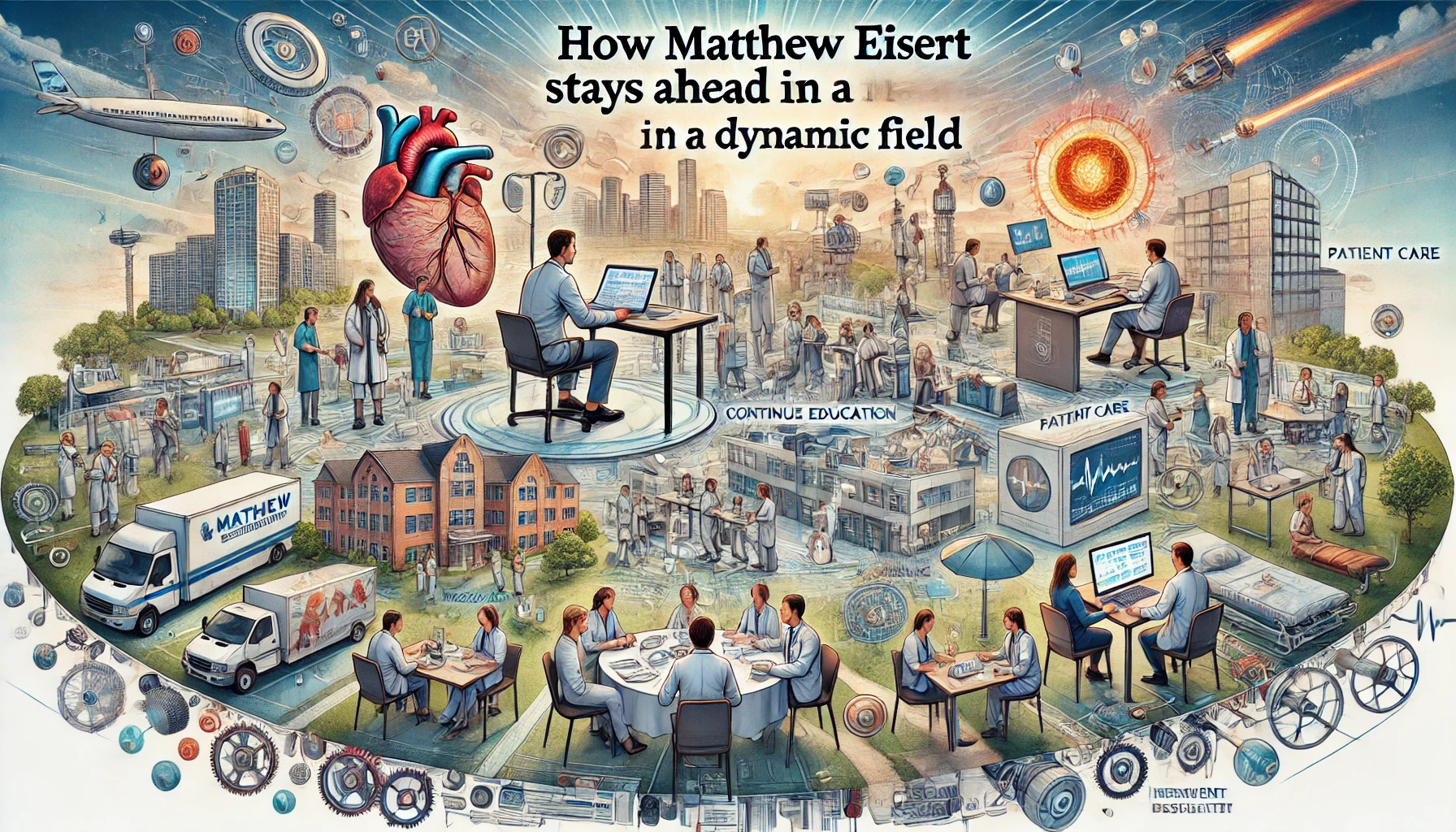Matthew Eisert Physician Assistant is a dedicated professional known for his significant contributions to the healthcare field. His role reflects the growing importance of physician assistants in providing accessible and quality medical care.
With a patient-focused approach, Matthew Eisert Physician Assistant emphasizes personalized care and efficient medical support. His expertise spans various aspects of clinical practice, showcasing his adaptability in addressing diverse healthcare needs.
Through his commitment to excellence, Matthew Eisert Physician Assistant exemplifies the critical balance between medical knowledge and compassionate care. His work highlights the value of collaboration within healthcare teams to ensure the best outcomes for patients.
As a skilled and experienced physician assistant, Matthew Eisert continues to contribute meaningfully to the advancement of healthcare, setting a standard of professionalism and dedication in his field.
The Importance of Patient-Centric Care: Reflections by Matthew Eisert Physician Assistant
Matthew Eisert Physician Assistant is widely recognized for his dedication to patient care and innovation in the medical field. Reflecting on the challenges and rewards of his profession, Eisert shares,
“Being a physician assistant is about more than medical expertise; it’s about listening to patients, understanding their needs, and being their advocate in the healthcare journey.”
Patients often express gratitude for the personalized care and attention they receive under his guidance. One patient shared,
“Matthew Eisert didn’t just treat my symptoms; he took the time to explain my condition and helped me feel confident in my treatment plan. That level of care is rare and invaluable.”
Eisert also emphasizes the importance of adaptability in a constantly evolving healthcare system. As he notes,
“Healthcare is dynamic. Staying ahead means embracing change, learning continuously, and always prioritizing the patient experience.”
Through these reflections, Matthew Eisert Physician Assistant showcases the qualities that define his success: empathy, innovation, and an unwavering commitment to excellence in healthcare.
The Vital Role of Physician Assistants in Healthcare
Physician assistants (PAs) play an essential role in the healthcare system, bridging the gap between patients and physicians.
One key contribution of physician assistants is their adaptability across specialties. Whether working in family medicine, emergency care, or surgery, PAs can seamlessly transition to meet the diverse needs of healthcare teams and patients.
The demand for physician assistants continues to rise due to their ability to alleviate the workload of doctors. They ensure that patients receive timely care, which is especially critical in underserved or rural areas with limited access to physicians.
Responsibilities of a Physician Assistant:
- Conducting patient assessments and physical exams
- Ordering and interpreting diagnostic tests
- Developing and implementing treatment plans
- Assisting in surgical procedures
- Providing patient education on health and wellness
The versatility of physician assistants makes them an invaluable resource in modern medicine, contributing to improved patient outcomes and greater efficiency in healthcare systems.
Career Overview of Matthew Eisert Physician Assistant
Matthew Eisert Physician Assistant has built a remarkable career characterized by dedication, expertise, and innovation in healthcare. His journey reflects the evolving role of physician assistants in addressing complex medical challenges.
With extensive training and experience, Matthew Eisert has worked across various specialties, showcasing his adaptability and proficiency in handling diverse medical cases. His focus on patient-centered care ensures that each patient receives personalized attention.
Eisert’s career highlights include his collaborative efforts with physicians and other healthcare professionals. This teamwork enhances patient outcomes, demonstrating the critical role of PAs in multidisciplinary care environments.
Table: Key Milestones in Matthew Eisert’s Career
| Year | Milestone |
| 2010 | Completed PA training and certification |
| 2012 | Joined a multidisciplinary healthcare team |
| 2015 | Specialized in emergency and acute care |
| 2020 | Led patient care initiatives in primary care |
Through his achievements, Matthew Eisert Physician Assistant continues to set a benchmark for excellence and dedication in the field.
How Physician Assistants Contribute to Improved Patient Care

Physician assistants are pivotal in ensuring that patients receive prompt and quality care. Their ability to manage a wide range of medical tasks allows for greater efficiency and accessibility within healthcare systems.
One major way physician assistants improve patient care is through extended face-to-face time with patients. They help bridge communication gaps, ensuring patients fully understand their diagnoses and treatment plans.
The presence of physician assistants also reduces wait times and enhances patient satisfaction. By taking on tasks such as initial assessments and routine follow-ups, they allow physicians to focus on more complex cases.
Key Benefits of Physician Assistants in Patient Care:
- Increased access to healthcare services
- Improved continuity of care
- Enhanced patient education and communication
- Reduced healthcare costs
The collaborative approach of physician assistants fosters a patient-centric environment, which is essential for achieving positive health outcomes.
The Journey of Matthew Eisert Physician Assistant in Modern Medicine
The journey of Matthew Eisert Physician Assistant exemplifies the evolution of the PA profession in modern medicine. His commitment to professional growth and patient care highlights the dynamic role of PAs in the healthcare industry.
Starting his career with a solid educational foundation, Matthew Eisert quickly gained experience in both clinical and administrative roles. His ability to adapt to various medical settings has been a cornerstone of his success.
Eisert’s journey also reflects his passion for lifelong learning. He stays updated with the latest medical advancements, ensuring that his patients benefit from evidence-based practices and innovative treatments.
Bullet Points: Highlights of Matthew Eisert’s Journey
- Completion of rigorous PA education and certification
- Experience in diverse specialties, including emergency and primary care
- Leadership in patient care initiatives and team collaboration
- Active engagement in continuing medical education
Through his journey, Matthew Eisert Physician Assistant has not only contributed to patient care but also served as a role model for aspiring healthcare professionals, demonstrating the impact and potential of the PA profession.
Responsibilities and Skills of an Effective Physician Assistant
Physician assistants (PAs) take on a variety of critical responsibilities to ensure the smooth operation of healthcare systems. Their duties range from conducting patient assessments to assisting in surgical procedures, making them versatile members of medical teams.
Effective physician assistants possess excellent communication skills, enabling them to interact with patients and healthcare professionals effectively. Their ability to explain diagnoses and treatment options helps foster trust and clarity in patient care.
Problem-solving skills are another cornerstone of a physician assistant’s role. They must be able to analyze complex medical situations and make quick, informed decisions to provide optimal care.
Key Responsibilities of Physician Assistants:
- Evaluating and diagnosing illnesses
- Prescribing medication under physician supervision
- Performing minor medical procedures
- Counseling patients on preventive care
- Collaborating with healthcare teams for integrated care
In addition to technical expertise, physician assistants must have a compassionate approach. This combination of skills and responsibilities ensures they meet the dynamic demands of modern healthcare.
Exploring Innovations in Healthcare with Matthew Eisert Physician Assistant
Matthew Eisert Physician Assistant has consistently embraced innovations to enhance the quality of care he provides. By integrating technology and evidence-based practices, he demonstrates a forward-thinking approach to modern medicine.
One area where Eisert excels is in the adoption of telemedicine. This technology has enabled him to extend healthcare access to remote areas, ensuring patients receive timely consultations and follow-ups.
Eisert also emphasizes the use of data analytics in patient care. By analyzing health records and trends, he can personalize treatment plans and improve patient outcomes.
Table: Innovations Matthew Eisert Physician Assistant Has Embraced
| Innovation | Impact |
| Telemedicine | Increased access to care for rural patients |
| Data Analytics | Personalized and efficient treatment plans |
| Mobile Health Apps | Enhanced patient engagement and monitoring |
Through these innovations, Matthew Eisert Physician Assistant continues to push the boundaries of traditional healthcare practices, making a meaningful impact on patient care.
The Growing Importance of Physician Assistants in Medical Teams

The role of physician assistants has become increasingly vital in medical teams, particularly as the demand for healthcare services grows. PAs provide essential support to physicians, ensuring that patients receive comprehensive and timely care.
Physician assistants are versatile professionals who can adapt to various specialties, from pediatrics to emergency care. This flexibility allows them to fill critical gaps in healthcare delivery, particularly in underserved areas.
Their collaboration with physicians and other healthcare staff fosters a multidisciplinary approach to patient care. By sharing responsibilities, PAs help reduce the workload of physicians, allowing for a more efficient healthcare system.
Key Contributions of Physician Assistants to Medical Teams:
- Enhancing team efficiency and workflow
- Providing continuity of care across specialties
- Supporting patient education and preventive care
- Assisting in research and clinical trials
As healthcare demands continue to evolve, physician assistants play a pivotal role in ensuring that medical teams remain effective and patient-focused.
Patient-Centric Practices Adopted by Matthew Eisert in His Role
Matthew Eisert Physician Assistant is known for his patient-centric approach, which prioritizes the needs and well-being of every individual he treats. His commitment to personalized care has earned him a reputation for excellence.
Eisert begins by ensuring clear communication with patients, explaining diagnoses and treatment options in a way that empowers them to make informed decisions. This transparency builds trust and fosters a positive doctor-patient relationship.
Another key practice he adopts is active listening. By understanding patients’ concerns and medical histories thoroughly, he tailors care plans that address their unique needs.
Bullet Points: Matthew Eisert’s Patient-Centric Strategies
- Emphasizing open and clear communication
- Actively involving patients in decision-making
- Using technology to enhance patient education
- Following up regularly to monitor progress and satisfaction
Through these practices, Matthew Eisert Physician Assistant demonstrates his unwavering commitment to improving patient experiences and outcomes, setting a high standard for care in the medical field.
Key Qualities that Define Success in the Physician Assistant Profession
Success in the physician assistant (PA) profession requires a unique combination of technical expertise, interpersonal skills, and adaptability. These qualities enable PAs to excel in a fast-paced and demanding medical environment.
One critical quality is strong problem-solving ability. Physician assistants must assess complex medical situations quickly and develop effective treatment plans, often under time-sensitive conditions.
Empathy and communication skills are equally essential. PAs interact directly with patients, explaining medical procedures, and offering emotional support, which fosters trust and enhances the patient experience.
Qualities of a Successful Physician Assistant:
- Analytical and critical thinking
- Exceptional communication and empathy
- Flexibility to work across medical specialties
- Commitment to lifelong learning in medicine
By embodying these qualities, physician assistants not only improve patient care but also contribute to the overall success of healthcare teams.
Insights into the Collaboration Between Physicians and Physician Assistants
Collaboration between physicians and physician assistants forms the backbone of modern healthcare teams. This partnership ensures that patients receive comprehensive, high-quality care.
Physician assistants like Matthew Eisert work closely with physicians to divide responsibilities. While the physician may oversee complex cases, PAs handle initial assessments, follow-ups, and routine tasks, improving team efficiency.
Clear communication is a key aspect of this collaboration. Regular discussions between physicians and PAs help align treatment plans and ensure continuity of care for patients.
Table: Benefits of Collaboration Between Physicians and Physician Assistants
| Benefit | Impact |
| Reduced Physician Workload | More time for complex cases |
| Enhanced Patient Experience | Improved access to care and communication |
| Streamlined Workflow | Faster and more coordinated treatment plans |
By fostering a collaborative environment, Matthew Eisert Physician Assistant exemplifies how teamwork between PAs and physicians leads to better outcomes for patients and healthcare systems.
The Evolution of the Physician Assistant Role in Healthcare Systems
The role of physician assistants has evolved significantly since the profession’s inception in the 1960s. Initially created to address shortages in medical staff, PAs have become indispensable in modern healthcare.
Today, physician assistants handle a wide range of responsibilities, from conducting patient assessments to assisting in surgical procedures. This expanded role highlights the trust and reliance placed on PAs within healthcare teams.
The growing demand for PAs is driven by an aging population and increasing healthcare needs. In response, educational programs for PAs have evolved to include advanced clinical training and specialty-focused curricula.
Milestones in the Evolution of the PA Role:
- 1965: Creation of the first PA program at Duke University
- 1980s: Expansion of PAs into specialty care
- 2000s: Increased autonomy in practice and prescriptive authority
The profession’s continuous adaptation underscores the critical importance of physician assistants in meeting the dynamic challenges of healthcare systems.
How Matthew Eisert Physician Assistant Stays Ahead in a Dynamic Field

Matthew Eisert Physician Assistant exemplifies how staying ahead in a dynamic healthcare field requires adaptability, continuous learning, and a proactive approach.
Eisert keeps himself updated on the latest medical advancements through regular participation in professional development programs and medical conferences. This commitment ensures his knowledge remains relevant and evidence-based.
Incorporating technology is another strategy Eisert employs. From telemedicine to data-driven decision-making tools, he leverages innovations to enhance the quality and efficiency of patient care.
How Matthew Eisert Physician Assistant Excels:
- Engaging in continuous education and certifications
- Utilizing technology to improve care delivery
- Adapting to changes in medical practices and regulations
By combining these practices, Matthew Eisert remains a leader in his field, setting an example for other healthcare professionals.
Future Trends in Healthcare for Physician Assistants Like Matthew Eisert
The healthcare landscape is constantly evolving, and physician assistants like Matthew Eisert are at the forefront of these changes. Future trends indicate an even greater reliance on PAs to meet growing healthcare demands.
One emerging trend is the integration of artificial intelligence (AI) in medical decision-making. Physician assistants will increasingly use AI tools to assist in diagnosing illnesses and predicting patient outcomes.
Telemedicine is expected to expand further, with PAs taking a lead role in providing virtual consultations.
Table: Future Trends in Healthcare for Physician Assistants
| Trend | Impact on PAs |
| Artificial Intelligence | Improved diagnostic accuracy and efficiency |
| Telemedicine Expansion | Greater accessibility for remote patients |
| Advanced Specializations | Increased expertise in niche medical fields |
By embracing these trends, professionals like Matthew Eisert Physician Assistant will continue to drive innovation and excellence in patient care.
Conclusion
Physician assistants, like Matthew Eisert Physician Assistant, play a pivotal role in the evolving healthcare landscape. Their ability to balance clinical expertise with compassionate patient care makes them indispensable in medical teams and across various specialties.
The contributions of professionals like Matthew Eisert extend beyond individual patient interactions. By embracing innovations, collaborating effectively with healthcare teams, and maintaining a patient-centric approach, they set a high standard for the profession.
As healthcare systems face increasing demands, the role of physician assistants continues to expand. Their adaptability and commitment to continuous learning ensure they remain vital in delivering quality care to diverse populations.
In the future, the impact of physician assistants will only grow, with leaders like Matthew Eisert paving the way for advancements in technology-driven, patient-focused medical practices. Their dedication highlights the potential for a more efficient and inclusive healthcare system.

